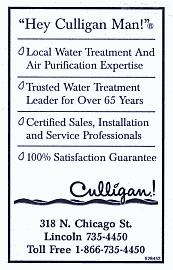|
"With record natural gas
prices, Illinois households will face skyrocketing home heating
costs this winter," Blagojevich said. "The grant from the Northern
Illinois Energy Project will allow us to help 55,000 more households
cut their heating bills. This new funding will go a long way toward
helping the most vulnerable households in Illinois stay warm this
winter and for many winters to come." Items in the kits include
low-wattage fluorescent light bulbs, weatherstripping, rope
caulking, plastic window insulation and energy-saving tips. If
residents follow the home weatherization recommendations, which can
also be found on the Keep Warm Illinois website, such as caulking
windows and doors, increasing insulation in their attics, sealing
electrical outlets, and purchasing energy-efficient appliances, they
can save as much as 30 percent a year in energy costs.
By bringing their heating costs down, homeowners may prevent
their utility services from being disconnected, which can be a
dangerous and sometimes life-threatening situation, especially to
seniors, young families and those suffering from significant health
complications.

"We're pleased to join with Governor Blagojevich and the Keep
Warm Illinois campaign in helping families save money on their
energy bills," said David Kolata, executive director of the Citizen
Utility Board, a partner in the Northern Illinois Energy Project.
"With utility prices rising rapidly, energy conservation has never
been more important than it is right now, and these energy kits
couldn't come at a better time."
"In these times of rising energy costs, the importance of energy
conservation is highlighted," said Richard A. Devine, Cook County
state's attorney. "We in public service must strive to help citizens
struggling with huge heating bills this winter, and this program
strives to address that need."
In October, Blagojevich launched the Keep Warm Illinois campaign,
a multiagency, comprehensive effort to help families reduce their
heating bills by conserving energy and weatherizing their homes. For
more information, visit
www.keepwarm.illinois.gov or call 1 (877) 411-WARM [9276].
The Northern Illinois Energy Project is a partnership of the
Citizens Utility Board, an Illinois nonprofit utility consumer
advocacy group; the city of Chicago; and the Cook County state's
attorney's office. The partnership was created to develop and
administer innovative programs to promote energy conservation and
reduce electricity costs for residential customers of Commonwealth
Edison. In addition, the Keep Warm Illinois campaign has also
partnered with Clear Channel Radio in Chicago, the United Way of
Illinois and the Chicagoland Chamber of Commerce.

The Department of Healthcare and Family Services will distribute
the kits to low-income households through its network of 35 local
Community Action agencies that administer the Low Income Home Energy
Assistance Program and the Illinois Home Weatherization Assistance
Program.
The Department of Healthcare and Family Services has trained
local agency staff to conduct consumer energy savings workshops for
interested residents. Participants are learning how energy is used
in the home and energy-saving strategies so they can reduce their
utility bills by better managing their energy use. The workshops
include presentations, handouts and a question-and-answer period.
Some helpful Keep Warm Illinois weatherization tips
-
Make sure that your home is
adequately sealed. Look for any leaks around doors and windows
that could let the heat escape and allow cold air into your
home. Use caulking, weatherstripping, and storm windows to
reduce heat loss. As an alternative, to cover the windows on the
inside, you can also use plastic sheeting, which is available
from local hardware or home improvement stores. An adequately
sealed home will provide energy savings and a comfortable
environment for the homeowner and their family.
-
Keep your furnace operating
efficiently. Have your heating or cooling equipment checked each
season by a qualified technician to make sure it is operating
properly. A properly operating furnace can make a great impact
on how much extra money you spend on your utility bills. Also
make sure you have the appropriate furnace size for your home.
-
Turn down your thermostat to 68
degrees. For every degree you lower your heat in the 60- to
70-degree range you'll save an average of 3 percent on heating
costs. Wear warm clothing like a sweater and set your thermostat
to 68 degrees or lower during the day and evening,
health-permitting. Open drapes and shades on the sunny side of
your house to help warm the home during the day. Close drapes
and shades at night to cut heat loss.
-
Save as much hot water as
possible because water heating is usually the second-largest
part of your energy bill. Use cold water when washing clothes
and, to reduce water use, take a five-minute shower instead of a
bath. Insulate the water heater tank and hot water pipes so heat
won't escape. Turn down the temperature when using the hot
water; it should be no hotter than 120 or 125 degrees
Fahrenheit. Also, fix any leaky faucets, install water-saving
showerheads and take showers instead of baths.
[to top of second column]
 |
 Northern Illinois Energy Project
The Northern Illinois Energy Project is also involved in projects
geared toward promoting energy conservation:
- The Residential Lighting Program was developed to increase
the use of compact fluorescent light bulbs and to raise
awareness that these light bulbs save utility costs and use less
energy. Compact fluorescent bulbs will be available at three
Chicago-area retailers for $1 per bulb, a 75 percent discount
off the normal price for these products, and they will be
provided to neighborhood stores where most light bulbs are sold.
- The Homeowners' Energy Conservation Program encourages
homeowners and developers to incorporate energy conservation
into their rehab and home improvement projects.
- Two School Education programs, still in development, will
teach children about energy conservation and give students the
tools to make their homes, schools and communities more
energy-efficient.

The Northern Illinois Energy Project is funded through a legal
settlement with ComEd on several regulatory cases. A portion of the
settlement funds was dedicated to the design and implementation of
energy-efficiency programs under the auspices of the founding
partners.
Blagojevich's comprehensive Keep Warm Illinois initiatives
include:
The Keep Warm Illinois website,
www.keepwarm.illinois.gov,
offers various no-cost and low-cost energy-saving tips, a Web-based
tool to conduct a home energy audit, links to energy assistance
programs and other resources. The Keep Warm Illinois toll-free
line, 1 (877) 411-WARM, is also available as another resource
for Illinois residents to learn how to save energy and get energy
assistance.
Warming centers and clothing drives -- State facilities
are now available as warming centers to offer Illinoisans a place to
keep warm during the day if they choose to turn down their
thermostat to reduce their home heating costs. The list of warming
centers locations is available at
www.keepwarm.illinois.gov
or by calling 1 (877) 411-WARM [9276].
Energy-savings workshops -- The Department of Commerce and
Economic Opportunity has partnered with community colleges across
the state to present workshops that offer important information on
how people can improve the efficiency of their homes. At these
workshops, Illinois residents will have access to information from
energy conservation experts on how to reduce overall energy costs.
 Winter Assistance Days -- The Department of
Healthcare and Family Services is working with congressional, state
and local leaders to organize a series of winter assistance events
throughout Illinois where low-income families can apply for the
state's energy assistance programs and receive free energy-savings
kits. Winter Assistance Days -- The Department of
Healthcare and Family Services is working with congressional, state
and local leaders to organize a series of winter assistance events
throughout Illinois where low-income families can apply for the
state's energy assistance programs and receive free energy-savings
kits.
Illinois Energy Efficient Affordable Housing Construction
Program -- The Illinois Department of Commerce and Economic
Opportunity has grants available to nonprofit housing developers
that include energy-efficient building practices in the rehab or
construction of affordable housing units. These building practices
often bring energy savings between 50 percent and 75 percent.
Winter storm preparation -- Illinois experiences five
severe winter storms each year, on average. Nearly 80 people in the
United States die from winter storms and extreme cold every year,
which is more than the fatalities due to tornadoes. The hazards
posed by winter storms and extreme cold can be catastrophic. So, the
Illinois Emergency Management Agency is offering a winter storm
preparation manual that includes important information on actions to
take now that will increase residents' chances of surviving winter
storms and extreme cold. The manual is available on the Keep Warm
Illinois website.
Senior safety -- If seniors lower their thermostats
to reduce heating bills, they can put themselves at risk of
developing hypothermia, a potentially fatal condition in which the
body temperature drops dangerously low. They are at an increased
risk especially if they take certain medications, drink alcohol,
lack proper nutrition and have conditions such as arthritis, stroke,
Alzheimer's disease and Parkinson's disease. The Department of Aging
recommends that seniors set their thermostats no lower than 65
degrees and follow other safety tips to help prepare for winter.
Keep Warm Illinois summit -- The governor invited over 50
statewide leaders from the consumer advocacy, social service,
business and philanthropic communities to meet at a Keep Warm
Illinois summit in November. The group recommended ways the private
sector could join with government to help everyone in Illinois
conserve energy and stay warm and safe this winter.
[News release from the governor's
office] |